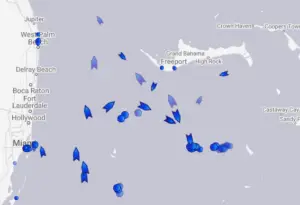
U.S. Coast Guard Investigates Passenger Deaths on Antarctic Cruises
U.S. Coast Guard Investigates Passenger Deaths on Antarctic Cruises By Delgado Trial Attorneys The U.S. Coast Guard is investigating the deaths and injuries of several
When Tragedy Strikes on the open oceans
Losing a loved one on a cruise ship in an accident is tragic. Whether a vacationing passenger or part of a ship’s crew, the loss of a loved one to preventable negligence is almost too much to bear. Certainly, it is something no one should have to go through. Making matters worse, when the accident that caused your loved one’s death occurred on the open waters, the path to justice is not always straightforward. Determining the best avenues to pursue legal claims on behalf of a deceased loved one is confusing for even experienced lawyers not versed in the nuances and complexities of maritime law. These situations are usually covered by the Federal Death on the High Seas Act, but not always.

The Death on the High Seas Act (“DOHSA”) comes into play when an individual’s death is caused by the wrongful act, negligence, or default of another occurring on the high seas. The “high seas” are defined as being beyond three nautical miles from the shore of the United States. But, what happens in those three miles closest to shore? What if there is a territorial island?
DOHSA allows the family members and dependents of the deceased to seek damages due to the untimely death of their loved one. DOHSA applies to the death of both maritime workers and non-maritime workers. The action is normally brought by the personal representative of the estate on behalf of the deceased individual for the benefit of their spouse, child(ren), parents, or other financially dependent relatives.
DOHSA allows for recovery of damages which represent the financial support the deceased’s family would have received had their loved one survived. DOHSA remedies are usually limited to payment of medical expenses, loss of inheritance, loss of support, loss of services and parental nurture to young children, and payment for funeral expenses. DOHSA does not pay damages for any pain and suffering the deceased suffered prior to death, lost wages pre-death, and mental pain and anguish or loss of society.
However, in the event the deceased is a seaman covered by the Jones Act, his or her estate may be able to pursue any pre-death pain and suffering damages under the Jones Act specifically.
When an individual dies outside of three nautical miles from the U.S. shore, any wrongful death action must be brought under DOHSA. However, DOHSA limits the type of damages that can be sought and only includes losses that are economic in nature, including the financial value or support the deceased offered to his or her surviving dependents and family members. However, it does not provide for non-economic damages like pain and suffering of the decedent’s loved ones, unlike Florida’s Wrongful Death statute or other similar state laws around the US. That is why it is critical you speak to a maritime wrongful death attorney who can provide guidance about the best course of action.
Moreover, DOHSA also does not necessarily provide for “survival” causes of action that allow a decedent’s family to recover for injuries they sustain on the high seas that are not the cause of their death, nor the pain and suffering caused during the event. Occasionally, these actions can be supplemented by other laws, including the Jones Act, which provides remedies for seamen who lose their lives during the course of their employment, but does not provide any remedies for injured passengers. Jones Act claims based on a seafarer’s wrongful death can only be brought by the personal representative of the estate and can only be brought against the deceased’s employer.
If the wrongful death occurs within the three nautical miles boundary, the decedent’s estate could have a cause of action under Florida’s wrongful death laws. Outside of that limit, these individuals are restricted to the remedies offered through DOHSA. However, the ability to to pursue a claim under Florida’s Wrongful Death Act is limited to claimants that are either children of the decedent’s below a certain age, the decedent’s spouse or a relative dependent on the decedent for financial support that can be proved with financial records in a court of law. Florida also limits the time an action can be commenced from the date of the decedent’s death to two years.
In contrast, DOHSA claims can be filed within three years from the date of death by DOHSA’s statute of limitations. However, some cruise ships claim their passenger tickets reduce this three-year statute of limitations to a one-year timeframe. It is important to read the fine print before pursuing a DOHSA claim, especially if the deceased was a cruise passenger.
We collaborate with out clients and explain the potential benefits and consequences of the available legal options and recommended strategies. Comprehensive knowledge of maritime law is essential, as is knowing when Florida law or Federal/International law benefits a certain client tailored to the facts of their case. As these laws make clear,
Cases such as these are not easy ones to win, and they require the assistance of experienced personal injury and maritime attorneys. At Delgado Trial Attorneys, we regularly fight for the rights of injured cruise ship passengers in situations like these.
Time is of the essence, when filing a lawsuit against one of the major cruise lines. These claims must be filed in the US District Court for the Southern District of Florida, in Miami-Dade County, Florida. Passengers have just one year from the date of the accident to file a claim. It is important that you hire an attorney experienced in handling cruise injuries in order to successfully recover damages to compensate for an injury sustained while onboard a cruise ship.
Given the complexities involved in maritime law, it is important that the Personal Representative of the deceased have a strong legal advocate guiding him or her along in the process, protecting the rights of the deceased’s family and loved ones to receive financial compensation for the decedent’s death. The attorneys and staff at Delgado Trial Attorneys are here to help guide you every step of the way.
The Miami-based maritime personal injury attorneys at Delgado Trial Attorneys possess a skill set that few other maritime attorneys can claim. Raul’s decade of experience representing the cruise lines and developing their defense strategies before he dedicated his career in 2018 to helping injured passengers and crew members and teamed up in 2020 with Raul, Sr. and his 44 years of personal injury experience and accident victim advocacy. to pursue their joint passion for victim advocacy. Delgado Trial Attorneys offers a combination of experience in all types of cruise ship and Florida accidents causing injury unlike any of their competitors.
Our experience allows us to effectively strategize and advocate for every client we represent. We have handled all types of cruise ship passenger accidents over the years with a focus on slip, trip and falls, medical malpractice, FlowRider accidents, sexual assaults, Death on the High Seas, and more. Contact our law firm today for a free case evaluation. Virtual sign-ups available

U.S. Coast Guard Investigates Passenger Deaths on Antarctic Cruises By Delgado Trial Attorneys The U.S. Coast Guard is investigating the deaths and injuries of several

Princess Cruise Passenger Falls Overboard En Route to Hawaii By Delgado Trial Attorneys A male passenger has been reported missing after falling overboard Princess Cruises’

THIS WEEK’S UPDATE: CORONA VIRUS, 2.0 This story was originally published on May 3, 2020 as first seen on our Facebook page By Delgado Trial

October is National Pedestrian Safety Month By Delgado Trial Attorneys The month of October marks National Pedestrian Safety Month. Pedestrian safety is important every day,